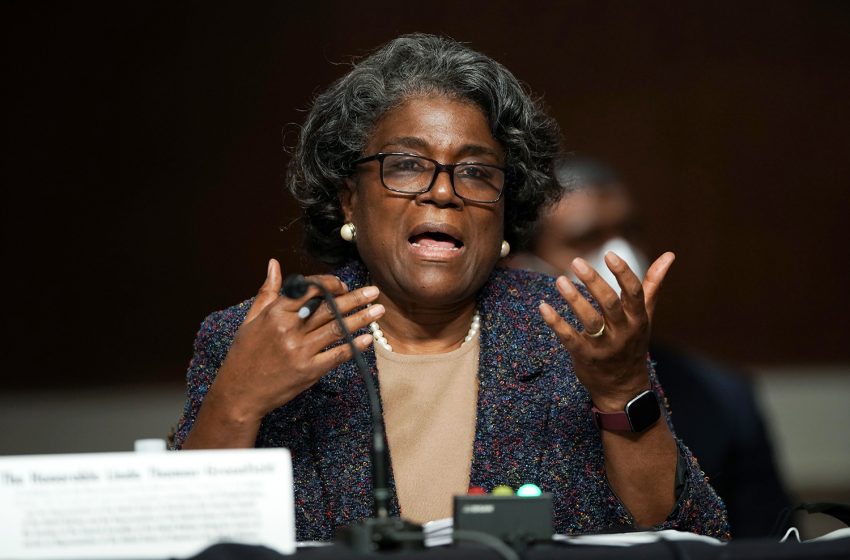
Remarks by Ambassador Linda Thomas-Greenfield at a Third Committee Meeting on Countries of Concern
Source: US UN
Ambassador Linda Thomas-Greenfield
U.S. Representative to the United Nations
New York, New York
October 4, 2021
AS DELIVERED
“All human beings,” reads the Universal Declaration of Human Rights, “are born free and equal in dignity and rights.” This profound statement is not an opinion. It’s a fact. Our human rights are inalienable and indivisible. They are interdependent and interrelated. And they are universal.
They do not change from country to country. They cannot be touched by the local laws of the land. We have seen dictators abuse human rights. We know all too well how States violate them. But no one – no one – can take them away. So, we must stand with human rights defenders, defend them ourselves, and speak out wherever and whenever human rights are being violated or abused.
If elected to the UN Human Rights Council, the United States will do just that. To that end, the United States is gravely concerned about the human rights situations in several countries. A complete version of our statement will be submitted for the record.
Let me start with Afghanistan, where the human rights situation is deeply worrisome. The Taliban said it will build a more inclusive political order which respects the rights of all persons. But early actions have been inconsistent with those commitments. We welcome the UN’s efforts to monitor and report on the human rights situation moving forward. We will judge the Taliban by its actions, not its words.
In China, the PRC is trying to divert attention from the genocide and crimes against humanity occurring in Xinjiang. We will not keep silent while over one million Uyghurs and members of other ethnic and religious minority groups are detained in internment camps. We also condemn extreme restrictions on human rights and on the long-held religious, linguistic, and cultural traditions in Tibet and call for the immediate release of democratic activists by authorities in Hong Kong.
In Syria, the Assad regime must release arbitrarily detained Syrians and provide information on the missing. As we work to hold the Syrian regime accountable for its atrocities, we look forward to hearing from the UN Independent International Commission of Inquiry as it documents credible cases of violations of international humanitarian law and of human rights.
In Nicaragua, the Ortega-Murillo regime has jailed opposition leaders, students, reporters, business leaders, human rights activists, and civil society members. We stand in solidarity with Nicaraguans risking their lives for their fundamental freedoms.
In Yemen, there are ongoing, credible reports of human rights violations and abuses by all parties to the conflict, including the use of starvation as a weapon of war, recruitment of child soldiers, arbitrary detention of civilians, torture, and sexual violence. We are particularly troubled by the continuous assault of basic freedoms in areas under Houthi control, where most Yemenis live.
In Venezuela, we agree with the High Commissioner for Human Rights: Maduro and his enablers have carried out intimidation and unjust prosecution of human rights defenders, union and faith leaders, and student groups. Maduro and his enablers must be held accountable.
In Ethiopia, we are alarmed by the expulsion of UN leadership, jeopardizing aid for all Ethiopians just as famine takes hold. This decision must be reversed. We have also heard accounts of rape used as a weapon of war and humanitarian access being blocked. All parties should come to the table immediately, without preconditions, and begin dialogue toward a negotiated ceasefire with the goal of saving lives. We are disturbed by regular reports of politically motivated disappearances and inhumane detention conditions in Eritrea, which raise serious concerns for its UN Human Rights Council candidacy.
In both Cuba and Belarus, we have been inspired by the bravery and courage of peaceful activists standing up to their country’s repressive regimes and demanding their human rights and fundamental freedoms.
And in Cambodia, the United States is troubled by continued reports of harassment and arbitrary arrests of human rights defenders, tightening restrictions on civil society and media, and the deterioration of multiparty democracy.
The Russian government has repressed political opposition, independent media, and civil society groups, even beyond its borders. It orchestrated illegitimate elections in Russia-occupied Crimea and in eastern Ukraine.
And officials in the Republic of Chechnya have committed widespread human rights violations and abuses against members of the LGBTQI+ community. All unacceptable.
Finally, the United States remains gravely concerned by ongoing human rights violations in Iran, Myanmar, and North Korea.
This list is not exhaustive, but it is indicative. These countries of concern – and every country around the world – must do more to protect and promote human rights. The United States will do everything in our power to hold abusers and violators to account.
###
